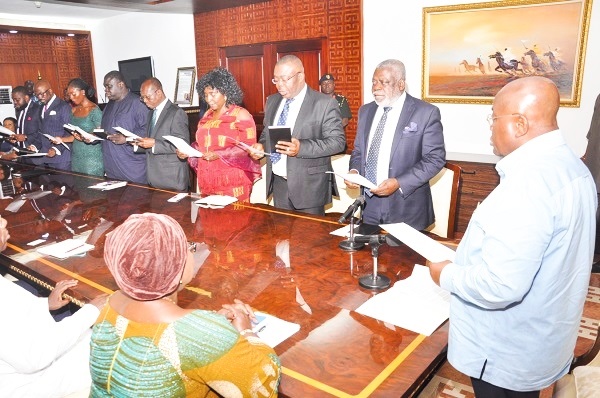He asked the board to execute its mandate with the mindset of “new king, new law; a new authority, a new culture of accountable governance and respect for the norms, sensibilities and practice of good governance” to ensure that Ghanaians derived good dividends from those state institutions.
The President gave the charge when he swore in a nine-member board for the SIGA at the Jubilee House in Accra last Tuesday.Members
The board, chaired by the business executive, Mr Terence Darko, has the Director General of SIGA, Mr Stephen Asamoah Boateng, as a representative from the Office of the President; Mr Kow Essuman, representing the Ministry of Finance; Mr David Collison, representing the Institute of Chartered Accountants, Ghana, and Mr Franklin Owusu Asafo Adjei as members.
The rest are a representative of the Ghana Bar Association, Mr Felix Intrakwah, and three nominees of the President — Mr Elikem Nutifafa Kuenyehia, Ms Yasmin Baba and Dr Margaret Duah Atuahene.
Rationale
The President observed that the old institutions did not work in the interest of the people, for which reason the new authority was established, and urged the board to ensure that it made a positive impact on the growth of the economy.He said the government expected high standards from members of the board, whom he described as astute and people with good credentials, to deliver.
President Akufo-Addo said both the authority and the board would work under the supervision of a ministry at the Presidency and, therefore, called for coherence, collaboration and cooperation among them for the successful execution of their tasks.

Appreciation
Mr Intrakwah, on behalf of his colleagues, expressed appreciation to the President for the confidence reposed in them.
He pledged the commitment of the board to work hard to realise the President’s visions.
Background
President Akufo-Addo launched SIGA on August 19, 2019 to replace the defunct State Enterprises Commission (SEC) and the Divestiture Implementation Committee (DIC).
It is charged with the mandate of ensuring efficiency and the financial viability of state-owned enterprises.
The President noted that state enterprises and state economic related institutions formed important parts of the overall business and economic architecture of the country and said it was high time they played productive roles in the development of the economy.
 info@businessghana.com
info@businessghana.com

















